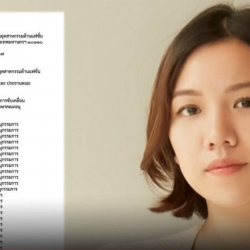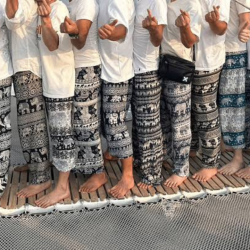We’re not voted into parliament because of our gender – Khattiya Sawatdiphol, Pheu Thai Party MP
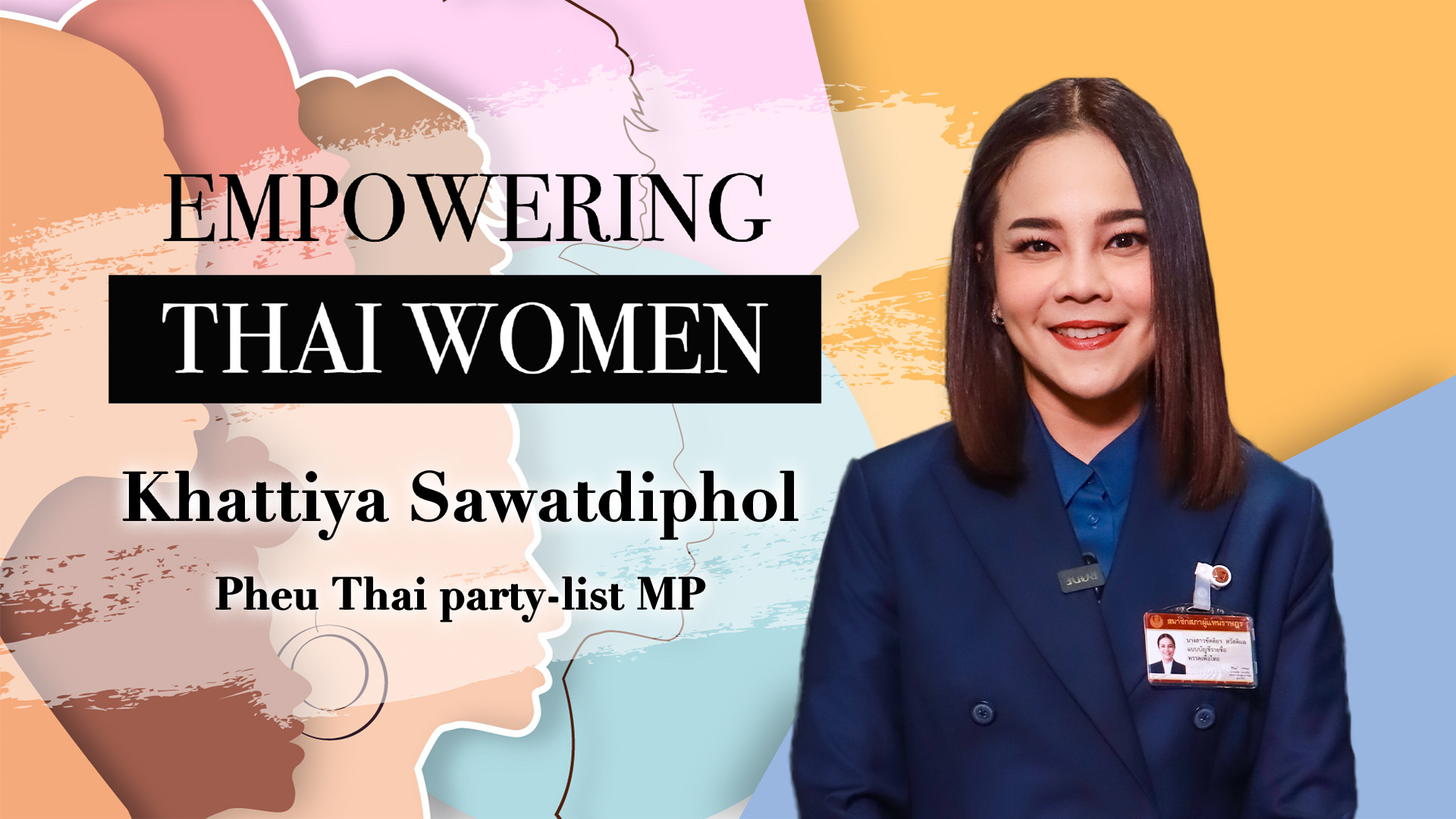
“When MPs are voted into parliament, they are chosen by the voters and they don’t choose us because of our gender. We’re all here because of our qualifications, because they believe in us. So, once you step into parliament, there shouldn’t be any segregation between men and women.”
Pheu Thai party-list MP Khattiya Sawatdiphol is widely known among Thais as the daughter of Major General Khattiya Sawasdipol, also known as “Se Daeng”, an outspoken soldier and political activist allied with protesters of the United Front for Democracy Against Dictatorship, collectively known as the “red shirts”.
Turning point
Initially a lawyer, Khattiya never thought that she would ever enter politics, despite her father’s wish for her to become an MP for his own party, Khattiyatham, which was established in 2008.
“My father would tell me every day that, if Abhisit dissolves the parliament, I must become the number-one party-list MP for his party,” she said.
“Back then, I returned after graduating from university abroad and I was a legal advisor for a private company. I thought that he was just kidding, but then my father told me to be ready every day. That was when I realised that he really wanted me to become an MP for his party, if I got the chance.”
The biggest turning point, however, was the political crisis during the Abhisit Vejjajiva administration, which saw widespread protests between the red shirts and the People’s Alliance for Democracy, known as the “yellow shirts”.
The deadly protests by the red shirts in May 2010 also saw the assassination of her father. She was only 29 years old at the time.
This tragic event eventually pushed her into politics, hoping that her father’s legacy would not be forgotten and that justice for those affected by the protests would be served.
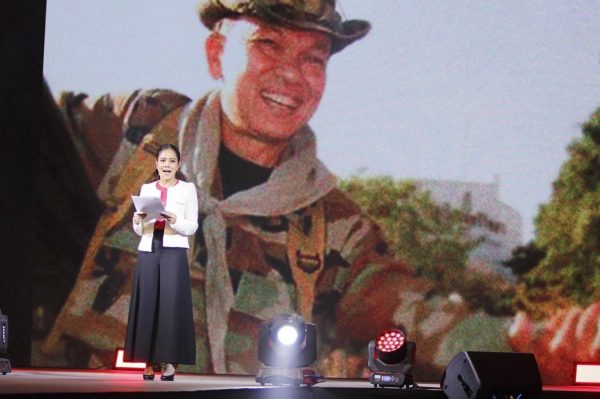
“Once I got the opportunity, I wanted to do this for my dad,” Khattiya explains.
“You know how Thai people would always say that Thais forget things easily, meaning that if an incident occurred over 10 years or so ago, it would already have been forgotten. So, I did what I could to make sure that my father, or at least what happened to my father, would still be remembered as part of Thai history and to do what I could so that my father’s name would still be remembered.
That’s why I’m still here. I’m here so that people are reminded that I’m the daughter of Se Daeng, who was killed during the red-shirt protests in 2010.”
Khattiya succeeded her late father as the leader of Khattiyatham party, before joining Pheu Thai as a party-list MP a year later.
She was also a former deputy spokesperson of the now-dissolved “Thai Raksa Chart Party”, a political party best known for nominating Her Royal Highness Princess Ubol Ratana Rajakanya as the prime ministerial candidate for the 2019 general elections, which led to the party’s dissolution by the Constitutional Court a month later.
Khattiya later returned to Pheu Thai and was elected as a party-list MP again in 2023.
Having a family background in politics, strong connections, or having prior-experience in activism is something of a requirement for political new-comers to succeed.
Like many others, the biggest struggle for Khattiya was not necessarily related to her gender, but the negative assumption by others that she became a politician only because of her father. Moreover, new-face politicians are often underestimated due to being “too young” to be in politics, as the political game is often dominated by “seniors”.
“I admit that I felt a lot of pressure,” she said. “My father played a huge role during the protests and was much loved by the red-shirts, but I would tell myself that I will do my best every day, even though it’s not at the same level as my father.”
On the flip side, Khattiya believes that her father’s legacy has helped her in her political career. As she explains, her father gave her the fundamental building blocks in order to succeed. Nevertheless, she strives to do her best in her role as a politician.
“Being the daughter of Se Daeng has helped me a lot,” she admits. “If someone is going to begin their political career, they would have to start with campaigning and meeting the electorate first.
For me, my dad has given me the fundamental building blocks and I just have to make it stronger. So, I’m proud to say that my dad has played a tremendous role in making me who I am today.”
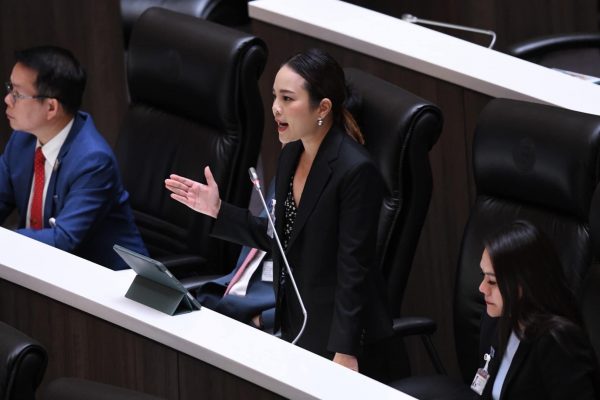
Don’t call me “lady”
After being in Thai politics for more than 10 years, Khattiya feels that female politicians are increasingly accepted by society. The gender bias against them still persists, but not as severe compared to the old days.
Though she barely experienced gender discrimination herself, Khattiya witnessed a number of micro-aggressions against female politicians. One of them is emphasising that a politician is a “lady” during parliamentary debates, or attacking them with demeaning references directed towards their gender, which she thinks is unacceptable
“When we’re performing our duties as an MP, we need to forget all the Mr, Mrs, and Ms titles first. Everyone here represents the people and are performing their duties for the people. So, if someone in parliament says “she’s a young lady”, don’t say that, because the people do not vote for MPs only because you’re a man or a woman, but because they believe that you can really serve the people.”
Currently, the percentage of women in the Thai parliament is 19.88%, an increase from the 2019 elections, which saw only 16.20%. Even though the percentage of female MPs has increased, Thailand is still below the global average of 26.8%.
“Of course, this is problematic, or else why are we still talking about women in politics?” she asked. “The reason why we are still talking about this it’s because we all see the same problem; people still think it’s unusual for women to become leaders in politics or become CEOs of a company.”
Therefore, to ensure gender equality in Thai society, the Pheu Thai MP believes that increasing female representation in parliament is not enough. A parliament should truly represent the Thai population, which she believes would be a good starting point. Once the number of female MPs are equal to male MPs, the topic of women in Thai politics would not be considered “unusual” anymore.
“Once parliament reflects the Thai population, we won’t have to talk about women in politics or in business anymore. Whenever parliament truly reflects the Thai population, that would be a success, and that’s the change I really want to see.”
She also noted, however, that having more female participation in parliament, or imposing a “gender quota” does not always mean that all women-related policies will be initiated.
Meanwhile, Khattiya wants to see more policies that ensure a better quality of life for women. One of them is the revival of the “Thai Women’s Empowerment Funds”, initiated during the Yingluck Shinawatra administration, which will ensure financial freedom and stability for female communities.
“Back then, [ex-PM Yingluck] believed that women can be breadwinners and can contribute to the economy. So, we have been trying to bring out their capabilities and any policy that will bring out women’s abilities and contribute to the country’s economy, Pheu Thai will do that.”

You can always grow stronger from the pain
When asked how hard it has been to prove herself qualified to be a politician, not only because of her father, the Pheu Thai MP felt that this battle will take forever.
“I think I will have to prove myself for the rest of my life,” she says.
“Honestly, I don’t know whether I have met people’s expectations, or how much I have to do to meet their expectations, but I feel that I have proven myself along the way. My dad’s fame can be used for a certain period of time, but other than that, it’s all up to me. I have to use my own abilities to go forward. I will still have to prove myself forever and there’s no way that I can say that I’ve succeeded and that people have accepted me already.”
As to what she would like to say to encourage women, Khattiya admits that it is difficult to come up with a sentence that would touch all women’s hearts, as everyone’s experience and struggles are different. However, she would like to encourage women to do their best every day and find resilience when they encounter hardships in life.
“If you’ve done your best today, do better, because I’m sure there will be great days ahead of you but, if you’ve been through a bad day, if you managed to get through this, you have won. Always remind yourself that, if anything bad happens and you managed to get through it, you will be able to get through anything.”
By Nad Bunnag, Thai PBS World

